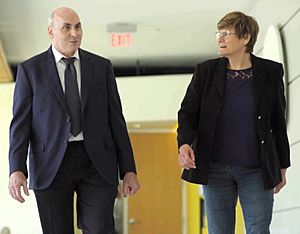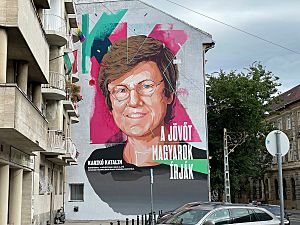Katalin Karikó facts for kids
Quick facts for kids
Katalin Karikó
|
|
|---|---|
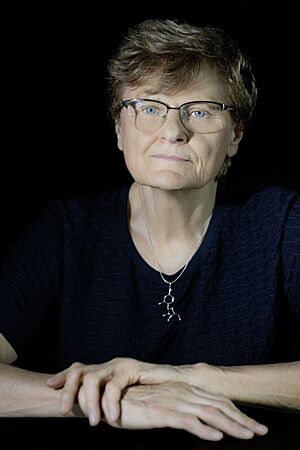
Karikó in 2024
|
|
| Born | 17 January 1955 Szolnok, Hungary
|
| Other names | Kati Kariko |
| Citizenship |
|
| Education | University of Szeged (BSc, PhD) |
| Known for | mRNA technology in immunology and therapies |
| Spouse(s) | Béla Francia |
| Children | Susan Francia |
| Awards | Nobel Prize in Physiology or Medicine (2023) and several others |
| Scientific career | |
| Fields |
|
| Institutions |
|
Katalin "Kati" Karikó (Hungarian: Karikó Katalin; born 17 January 1955) is a Hungarian-American biochemist. She is famous for her work on ribonucleic acid (RNA), especially messenger RNA (mRNA). Her research helped create the amazing mRNA vaccines we have today. She faced many challenges and doubts from other scientists, but she kept going.
In 2023, Katalin Karikó won the Nobel Prize in Physiology or Medicine for her important work. She shared this award with American immunologist Drew Weissman. Their discoveries made it possible to develop new medicines and vaccines, including the ones used to fight the COVID-19 pandemic.
Karikó was a leader at a company called RNARx from 2006 to 2013. Later, she joined BioNTech RNA Pharmaceuticals, where she became a senior vice president. In 2022, she left BioNTech to focus more on research. She is now a professor at the University of Szeged in Hungary, where she also received an honorary degree.
Her work with Drew Weissman led to a key discovery: how to change mRNA so it doesn't cause a strong immune reaction in the body. This was a huge step forward for using mRNA in treatments. Their technology was used by companies like BioNTech and Moderna to create the COVID-19 vaccines. These vaccines helped control the SARS-CoV-2 virus around the world.
For their groundbreaking work, Karikó and Weissman have received many awards. These include the Lasker–DeBakey Clinical Medical Research Award, being named Time Magazine's Hero of the Year in 2021, and the Tang Prize Award in Biopharmaceutical Science in 2022.
Contents
Early Life and Education
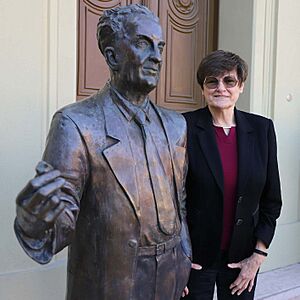
Katalin Karikó was born in Szolnok, Hungary. She grew up in a small town called Kisújszállás. Her childhood home did not have running water, a refrigerator, or a television. Her father was a butcher, and her mother was a bookkeeper.
Katalin was very good at science in school. She even placed third in a national biology competition in Hungary. She earned her first degree in biology in 1978 and her PhD in biochemistry in 1982. Both degrees were from the University of Szeged. After her PhD, she continued her research at the Biological Research Centre in Hungary.
In 1985, her research lab lost its funding. Karikó then looked for work in other countries. She was offered a research job at Temple University in the United States. She moved to the U.S. with her husband and two-year-old daughter. They brought money they had saved from selling their car.
Her Scientific Journey
Between 1985 and 1988, Karikó worked at Temple University in Philadelphia. She was part of a study that treated patients with certain illnesses using double-stranded RNA (dsRNA). This was very new research at the time.
In 1989, she started working at the University of Pennsylvania. There, she teamed up with a heart doctor named Elliot Barnathan. She began to focus on messenger RNA (mRNA). In 1990, she applied for her first grant to develop mRNA-based gene therapy. This became her main research interest.
However, in the 1990s, many scientists and companies lost interest in mRNA. They doubted its potential. Karikó found it hard to get funding for her work. Even though she was on track to become a full professor, the university lowered her position in 1995 because her grant applications were often rejected. But she decided to stay and keep working on mRNA.
Working with Drew Weissman
In 1997, Karikó met Drew Weissman, an immunology professor at the University of Pennsylvania. They started sharing ideas and working together. Weissman's funding was very important for Karikó to continue her research. Their combined knowledge of immunology and biochemistry was very effective.
They worked hard to solve problems with mRNA technology. Weissman said, "We had to fight the entire way." Karikó's determination was truly special in the world of academic research.
One big problem with using mRNA for treatments was that it caused inflammation in the body. Karikó had a key idea when she noticed that another type of RNA, called transfer RNA (tRNA), did not cause this immune reaction.
Starting in 2005, Karikó and Weissman showed that by making small changes to mRNA, they could stop it from causing inflammation. They found that replacing a part called uridine with pseudouridine made a big difference. Their discovery was first turned down by major science journals, but it was later published in Immunity.
Another important step was developing a way to deliver mRNA into the body. They created a method to package mRNA in tiny fat droplets called lipid nanoparticles. These tiny droplets protect the fragile mRNA until it reaches the right place in the body. They showed that this method worked well in animals.
From Research to Vaccines
Karikó and Weissman started a small company called RNARx. In 2006 and 2013, they received patents for their modified mRNA technology. The University of Pennsylvania later sold the license for this technology.
In 2013, Karikó learned about a big deal that another company, Moderna, made to develop mRNA treatments. She realized she might not get the chance to fully use her mRNA experience at the University of Pennsylvania. So, she took a job as a vice president at BioNTech RNA Pharmaceuticals. She later became a senior vice president there.
As of October 2023, Karikó is a professor at the University of Szeged in Hungary.
Scientific Impact
Karikó's research has had a huge impact. It has opened doors for new treatments and technologies. Her work laid the foundation for companies like BioNTech and Moderna to create mRNA treatments that do not cause a strong immune response.
In 2020, Karikó and Weissman's technology was used to create the COVID-19 vaccines by BioNTech (with Pfizer) and Moderna. These mRNA vaccines were developed very quickly and were over 90% effective. This helped greatly in fighting the COVID-19 pandemic.
Besides vaccines for diseases, mRNA technology also has potential uses in treating some cancers, heart diseases, and metabolic conditions.
Awards and Honors
Katalin Karikó has received more than 130 international awards and honors. These recognize her pioneering and globally important work in biochemistry.
On October 2, 2023, the Nobel Assembly at the Karolinska Institute announced that the Nobel Prize in Physiology or Medicine was awarded to Katalin Karikó and Drew Weissman. This was for their development of mRNA technology.
In April 2024, Katalin Karikó donated the money she received from her Nobel Prize to her former university, the University of Szeged.
In 2022, Karikó and Drew Weissman received The Novo Nordisk Prize for their work on modified mRNA. In 2023, Karikó was added to the National Inventors Hall of Fame for her mRNA research.
She was also named one of the 100 influential people in health by Time magazine in 2024. In December 2024, she was included on the BBC's 100 Women list. In May 2025, Karikó was elected to the National Academy of Sciences.
Personal Life
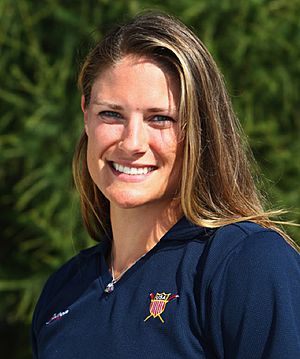
Katalin Karikó is married to Béla Francia. They have a daughter, Susan Francia, who is a two-time Olympic gold medalist in rowing. Their grandson was born in the U.S. in February 2021.
Media and Books
In April 2021, The New York Times wrote about her career and how it led to mRNA vaccines for the COVID-19 pandemic. The Daily podcast from The New York Times also featured her story in June 2021, highlighting the many challenges she overcame.
In November 2021, Glamour magazine named her a Woman of the Year.
In 2023, two children's books were released about her: Never Give Up: Dr. Kati Karikó and the Race for the Future of Vaccines and Kati's Tiny Messengers: Dr. Katalin Karikó and the Battle Against COVID-19.
Katalin Karikó's own autobiography, titled Breaking Through: My Life in Science, was published in October 2023, shortly after she won the Nobel Prize. This book became a best-seller in Hungary in 2023. It has been translated into 9 languages.
See also
 In Spanish: Katalin Karikó para niños
In Spanish: Katalin Karikó para niños
- Tozinameran – The COVID-19 vaccine from Pfizer BioNTech
- Uğur Şahin, co-founder of BioNTech
- Özlem Türeci, co-founder of BioNTech
 | Claudette Colvin |
 | Myrlie Evers-Williams |
 | Alberta Odell Jones |


